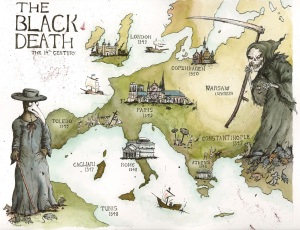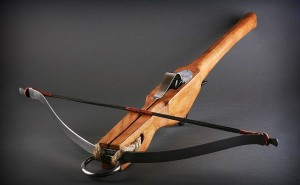The Black Death and the Birth of the West
Today’s post is a “Best of the Dark Herald” REPOST.
Cohen the Barbarian: What do you think it means when people invent a dish like “Pig’s Ear Soup?”
Rincewind the Wizzard: It means they are a virtuous, frugal and abstemious people!
Cohen the Barbarian: It means someone else filched the rest of the pig!! – Interesting Times by Terry Pratchett.
Until 1350 that was pretty much the history of the entire world.
A civilization would startup somewhere. Populations would expand because of the higher standard of living but then the population would grow a little too big. Lifestyle standards would drop. Grain agriculture would just barely keep everyone fed. Sons would slavishly follow fathers into whatever profession the father himself had been born into because at least that provided security and security was everything. It kept you from slipping down the ladder. This was vital because no one ever climbed back up the ladder again. Ever.
Everyone worked themselves to the bone all their lives because there was no need for a labor-saving device when there was so much labor just lying around ready to be whipped (literally) into action.
Societies inevitably became hierarchical. And then caste divided. Improvements weren’t really possible because there were no resources to be spared for innovation. The people on top spent their lives busting their humps to make sure everyone below them remembered that their place was below them.
The results speak for themselves. In the year 1000AD, the Song Dynasty in China was the most powerful nation on Earth. When Europe decided to plunder the Middle Kingdom in the 1800s, they could do nothing at all to stop it because it was essentially the same China from 800 years ago. Nothing had changed for nearly a thousand years.
History doesn’t repeat itself but it does rhyme. The rhythm of human civilizations was invariably population expansion followed by a highly static stagnation with no innovation.
This is the Zero-Sum Game.
So why is the West so special? How were we able to break the wheel of fate?
The answer is… We didn’t.
It was broken for us by the greatest biological disaster in history.
The Black Death was the deadliest plague the human race has ever seen. The population of the West was decreased by 65%, in some places the mortality was as high as 80%. The Plague destroyed an entire world but from it’s ashes rose a glorious phoenix.
The entire fabric of a civilization unraveled as the survivors of an Apocalypse tried to build new lives for themselves.
I’m going to sidestep the horrors of the Black Death and move on to the aftermath for those who survived it.
We will start with the people generally thought of now (and inaccurately) as the people on the lowest rung. The Peasant. The peasant was little better than a slave. He was bound to the land that he rented from his landlord. Often had to be in debt to that lord to buy seed, tools, and oxen. The peasant also had to work whatever land the landlord told him to work no matter how unsuitable it was for growing wheat. And the landlord wanted all of it used for growing wheat because it was no skin off his ass if the Peasant had to spend all spring picking field stones off the ground on one patch of hillside just to grow another half bushel.
But after the plague went through town, the following conversations became commonplace.
Peasant: Spring planting is almost here m’lord.
Landlord (rubbing hands greedily together): Ah yes! Excellent! I expect you’ll need a loan to buy seed. The interest rate this year will be…
Peasant: You’re buying the seed for me, m’lord.
Landlord: What did you say!?
Peasant: Also I’ll need a new ox. Old Iacapo finally went into the stewpot last February.
Landlord: Me buy you an Ox?!?!
Peasant: And just so you know right now, I am not even going to try to farm that rock patch on the hill, let alone the swamp, m’lord.
Landlord (momentarily lost and flustered): Well what am I to do with them?
Peasant: I couldn’t care less.
Landlord (enraged): I’ll have you flogged!
Peasant: You’ll have to catch me first.
Landlords that refused to pay suddenly found themselves without peasants at all. Sure there were laws to stop peasants from taking off but population reduction made them unenforceable. And once the peasant had a new landlord with a better grasp of reality he also had a protector.
The fields that were left fallow were turned into pasture because you only needed the aforementioned peasant’s daughter to act as a shepherdess. Less suitable land was allowed to return to the forest.
It wasn’t just the peasants who suddenly found that life was quite a bit better for them.
Guilds were a monopoly that tradesmen used to protect themselves by making their skills scarce. They controlled the knowledge base, so it wasn’t just anyone who could do their jobs. Until suddenly anyone could. After the Plague, if the trades were going to survive at all they needed to bring in any kid who wanted a job as an apprentice, not just sons and nephews (who were largely and inconveniently dead at this point). And if you have to pick a stranger you may as well pick the best one.
And you didn’t even need to be skilled to get on the gravy train. As agricultural rents collapsed. Labor prices soared. Simple manual labor was demanding triple of what had been the going rate and genuinely skilled labor went through the roof:
“Serving girls and unskilled women with no experience in service and stable boys want at least 12 florins per year, and the most arrogant among them 18 or 24 florins per year, and so also nurses and minor artisans working with their hands want three times of nearly the usual pay…”
Shocking stuff I know.
One interesting thing to look at is the commodities prices because they are the most accurate measure of how European society had shifted. Demand for wheat dropped through the basement but barley (which is another way of saying beer) stayed about the same as the pre-plague world. The price of meats didn’t change much either and the thing about that is, there was a lot more meat all of a sudden because of the production shift to animal husbandry. This means that even the increased supply was barely meeting demand. In summary, everyone’s diet was drastically improving.
“The common people, by reason of the abundance and superfluity that they found, would no longer work at their accustomed trades; they wanted the dearest and most delicate foods … while children and common women clad themselves in all the fair and costly garments of the illustrious who had died.”
This is a lot more significant than you think. Clothing has always been the way you tell the world who and what you are. When you suddenly live in a world where the lowest are dressed as the finest you can’t tell them apart just by looking at the fashions they follow. A major function of caste division was broken. Look, guys, Europeans are waaay more class-conscious than Americans but I assure you it is nothing when compared to Arabia or India, or even good old Communist China. The bottom rung forgot its place in Western Europe and never really relearned it.
The Black Death also ramrodded technological innovation. High labor costs finally created a demand for labor-saving devices.
Mills for instance had been around since the Roman Empire but they had been used exclusively for grinding grain. They didn’t have time for anything else. But with a drastically lower demand for wheat, they were free to do just about everything. From the fulling of wool cloth to sawing lumber to operating bellows. All of these things had been done just well enough by massive amounts of readily available hand labor. When that source of power vanished, human labor was replaced by massive amounts of energy for the first time in history. All this energy was creating surpluses where there had only been bare sufficiency before. And in the case of metallurgy, it created spare time for experimentation.
Technological innovation, which had plateaued out, just like it had in every other civilization in history, was now suddenly galloping ahead into unknown territory.
Maritime transport exploded. Shipping had always been handled by a bunch of small ships with small crews, plus a few big ships with big crews. But the plague and its aftermath created a unique need for big ships with small crews. It turned out that these could stay at sea a lot longer and as a result go a lot farther.
Then there was the nameless genius who thought of combing this:
With this:
To produce this:
Initially, the matchlock was simply viewed as a cheaper and easier-to-operate version of the crossbow. Much less accurate of course but, it was reasoned, if you tried putting enough of them together and had them fire at the same time, that might make up for the inherent inaccuracy of… Oh my, look at what that just did. Well, that’s it for knighthood I guess.
Finally came the most important innovation of all.
The first internet.
Gutenberg was the final inheritor of a tontine of inventions. He wasn’t any genius, he just happened to be the guy to put them together first. This is the same situation that existed with Alexander Graham Bell and Elisha Grey. It didn’t matter if Gutenberg hadn’t invented the printing press, because someone else would have at about the same time.
Gutenberg really didn’t invent anything at all, he just put a bunch of existing technologies together and utterly destroyed his world.
The printing press really was the first Internet. For the first time in history, people could share their thoughts. Then form dialectics. Then chisel out new ones, when the old dialectics collided. Terrible wars happened because of this. What should have been a minor schism turned into the Protestant Reformation. But there was also an upside.
As horrible as the Black Death was it created a civilization that spiraled upward for the first time in history.
That is why the West is so precious. And don’t fool yourself, the West hasn’t caught on in too many other places on the planet. Most cultures still see life as the zero-sum game.
The really bad news is that the fools who now run the West are inviting those places to move in with us.






